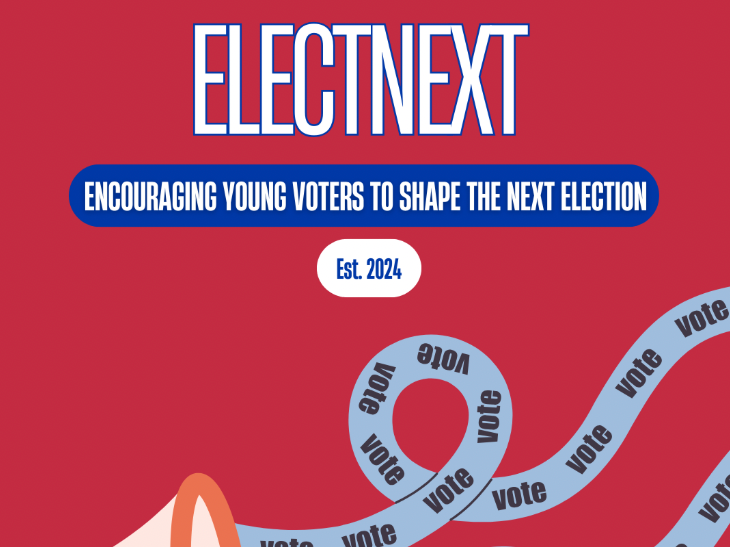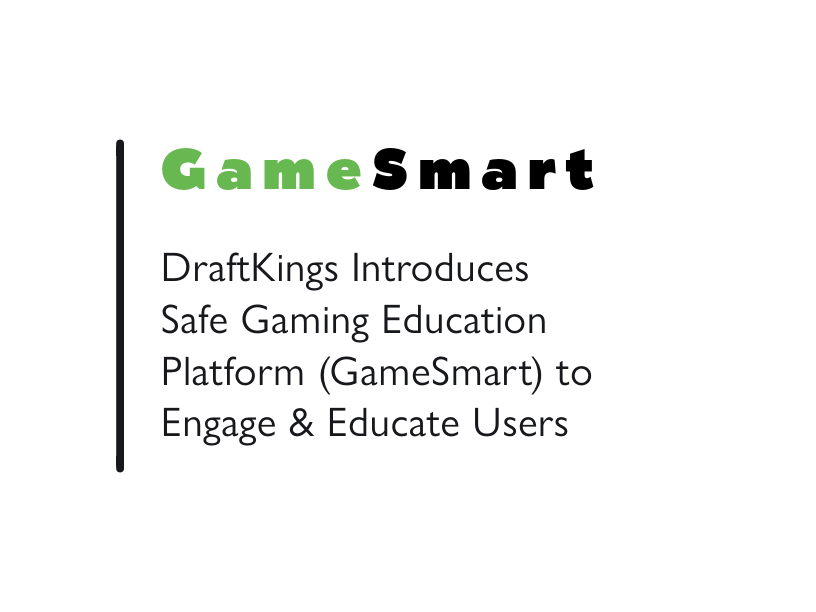Innovations in PR Paper
Siena Varano
PRL 206
Professor Horn
Bet on Better: Empower Responsible Gambling with GameSmart
DraftKings Headquarters
222 Berkeley Street, 5th floor, Boston, MA 02116
Research
The problem of underage betting is a critical issue for online sports betting platforms and is a problem that DraftKings, as an organization, has been facing for many years. Underage gambling is an issue that affects and limits the entire gambling industry from successfully increasing legal engagement. DraftKings was founded in 2012 at its headquarters in Boston, Massachusetts, by Jason Robins, Matthew Kalish, and Paul Liberman. The organization leads in the sports digital entertainment space and is known for its sports betting and iGaming platforms, as well as its partnerships with major leagues like the NFL and NBA.
According to the National Council on Problem Gambling, around 60-80% of high school students have gambled for money within the past year, and around 4-6% have developed serious gambling-related problems. This horrifying statistic is present before young adults are reaching a collegiate age. The problem of underage gambling is something that is beginning at such early stages in teenagers’ lives that a proactive educational approach is the only way to address the early exposure.
A 2023 survey by the National Collegiate Athletic Association (NCAA) found that “67% of students living on campus are bettors and tend to bet at a higher frequency. 41% of college students who bet on sports have placed a bet on their school’s teams and 35% have used a student bookmaker” (“NCAA releases sports wagering survey data”). These findings highlight how common the problem of underage sports betting is accross college campuses which proves the problem to be continuous across different age groups.
Research from the International Centre for Youth Gambling Problems and High-Risk Behaviors at McGill University states that adolescents are more likely than adults to develop gambling addictions. In addition, engaging in betting and illegal types of behavior from a young age often leads to further financial issues and addictive patterns.
These findings highlight the importance of GameSmart’s initiatives in emphasizing responsible decision-making. With all the proven research to back the problem of underage gambling, it is so important to encourage a platform to educate students as they approach a legal gambling age. Despite strict age restrictions, young users are often attracted to the excitement of sports betting, leading to unintended engagement. Research indicates that many young students are engaging in sports betting without fully understanding the weight of their actions and their associated risks.
DraftKings’ reputation as a socially responsible brand is at stake, as public concern grows over the effects of underage gambling on youth welfare. This is a public relations issue because DraftKings needs to balance their role as a leading sports betting platform, while ensuring the safety and welfare of their users. In doing so, DraftKings must recognize that as an organization they are indirectly contributing to the normalization of underage gambling. Addressing the problem through the GameSmart initiative allows DraftKings to take on a proactive approach to demonstrate accountability that aligns with the socially responsible reputation that the brand strives to maintain.
Audience
Through the GameSmart youth initiative, DraftKings aims to reach an audience within the youth and family demographic to address the risks associated with underage gambling. The primary audience is young adults, ages 16-25. This segment includes underage users and the individuals who are becoming of legal age to gamble who may have limited experience in financial management. This is the primary audience because it is the direct demographic of people that the initiative will be working with. In addition, young adults are at the highest risk for developing irresponsible gambling habits.
The secondary audience is the parents and guardians of young adults. Parents and guardians often play vital roles in shaping their children’s behavior and social awareness. In order for GameSmart to become very successful, it is important to educate parental figures so that they can help recognize problematic patterns and help guide conversations about responsible tendencies surrounding gambling. Although parents may not be directly affected by GameSmart initiatives, they are often heavily influenced by their child’s irresponsible gambling and in many cases are left with the burden of “bailing” their child out of their gambling debt.
The territory’s audience is educational institutions and youth organizations. Schools and educational places offer great opportunities to incorporate responsible practices into their curriculums. It has been proven that many dangerous habits begin as early as high school. Having resources readily available across educational institutions could allow struggling students to engage in resources that extend beyond the academic setting.
Goal
The main goal is to establish GameSmart as the leading educational platform for responsible gambling, fostering a well-informed and responsible audience among young adults. GameSmart’s initiatives include: interactive learning modules, parental controls and guidance, age-restricted access, gaming simulations for young enthusiasts, etc. The initiative aims to create an experience called “Bet on Better,” engaging young adults in familiar formats that simulate the platforms they would be gambling on. The Bet on Better experience would replicate real world decision-making and educate users on concepts such as risk and rewards associated with gambling. By including rewards such as leaderboards, users will hopefully be more willingly engaged to find joy in educating and understanding the gambling world.
Objectives
The objectives are to increase GameSmart’s engagement and ensure the initiative remains active and popular. With all of GameSmart’s objectives they are specific, measurable, attainable, results-oriented, and time-driven. Within the first year GameSmart aims to increase engagement by 20% and to have a completion rate of 50% for GameSmart financial literacy modules among users. It is as important to complete the modules and enter into the educational space to grow and take away all that the program offers. GameSmart also plans to increase the amount of parents and guardians accessing GameSmart’s parental resources by 25% within six months. This is very important because many parents will greatly appreciate the program and spread the word. GameSmart hopes for word to spread across social media through the potential use of big name sports enthusiasts and influencers to increase positive social media comments and shares by 25% in the first six months. Lastly, to ensure long-term retention GameSmart aims for at least 60% of users to revisit the platform within six months of beginning. This is important because it will ensure that GameSmart initiatives exceed its initial impressions.
PESO Model - Analysis
In terms of media, the PESO Model for DraftKings will include paid, earned, shared, and owned media. Each category of media will have different tactics to reach the public. This approach provides a breakdown of the strategies and ways to promote GameSmart.
Paid media will be mainly used through social media where the brand will target young adults across TikTik, Instagram, and other platforms. Social media ads are a great way to spread the word about the initiative and social media is the best way to reach a younger demographic of people. Another way that paid media will be used in this plan is through partnerships with influential people and brands. Working with retired athletes and people that are very popular on social media are great ways to show the public that GameSmart is a platform that benefits and can change the lives of so many people.
Earned media can be achieved through featuring DraftKings representatives on podcasts like The Ramsey Show or Smart Passive Income which provides an opportunity for discussions on the initiative’s impact. This would connect DraftKings with a community of listeners who value financial literacy through using respected voices in personal finance. In addition, reaching high-visibility outlets such as CNBS and The New York Times can be used to reach a broader public.
One of the biggest ways to gain attention is through shared media which GameSmart can do through forming and developing an interactive relationship with their audience. It would be very beneficial to interact with followers through answering direct messages, comments, and staying active on social media. GameSmart can also collaborate with Universities and Colleges to develop workshops and provide low-cost resources. GameSmart can also create hashtags and feature stories of different users (#betonbetter or #DraftKingsGameSmart). A hashtag could develop an authentic community and increase trust in the initiative.
Lastly, owned media refers to the content that DraftKings owns and oversees. This includes their website and emails. The organization can create email campaigns to keep the public informed and updated, while reassuring GameSmart’s commitment to their initiatives. Additionally, customer trust is increased and further developed when they can see that the website and product pages are transparent and honest about the platform and its intentions.
Conclusion
By tackling the issue of underaged gambling head-on, DraftKings has the opportunity to enhance its reputation, and mitigate potential backlash for not working responsibly to encourage safe tendencies for its users. GameSmart is an education initiative that will set DraftKings apart and allow the organization to get ahead of a pressing issue that has been facing the online gambling industry for a long time.
Using this strategic plan allows DraftKings to see the audience, goals, objectives, and ways (PESO-Model) that GameSmart will promote sustainability, openness, and transparency for the organization. The intended audience for this initiative is young adults, ages 16-25 who are underage users and the individuals who are becoming of legal age to gamble. The initiative’s main objectives are to proactively get involved with the problem of underage gambling and for the initiative to last long-term. The main goal is establishing credibility as a leading educational platform and seeing results from DraftKing users, showing that the initiative is making a difference. The PESO-Model aims to create a strategy to educate and align DraftKings with responsible gaming principles and financial responsibility. To promote an informed and loyal audience in an industry traditionally viewed as untrustworthy, DraftKings has the opportunity to create positive change within the casino space, demonstrating a genuine commitment to public interest and fostering a credible brand image.
Bibliography
Dickson, Lynda, et al. Youth Gambling in Canada: A National Survey. McGill University, 2008, youthgambling.mcgill.ca/en/PDF/Publications/2008/dickson.pdf. Accessed 30 Oct. 2024.
DraftKings. DraftKings Casino, www.draftkings.com/. Accessed 2 Nov. 2024.
“DraftKings Inc. (DKNG) Company Profile.” StockAnalysis.com, www.stockanalysis.com/stocks/dkng/company/. Accessed 1 Nov. 2024.
National Council on Problem Gambling. “NCPG.” National Council on Problem Gambling, 2024, www.ncpgambling.org/ncpg/. Accessed 31 Oct. 2024.
“NCAA Releases Sports Wagering Survey Data.” NCAA, 24 May 2023, www.ncaa.org/news/2023/5/24/media-center-ncaa-releases-sports-wagering-survey-data.aspx. Accessed 8 Nov. 2024.




